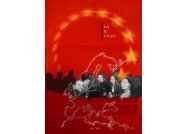turkish-greek civic dialogue - AEGEE Europe
turkish-greek civic dialogue - AEGEE Europe
turkish-greek civic dialogue - AEGEE Europe
You also want an ePaper? Increase the reach of your titles
YUMPU automatically turns print PDFs into web optimized ePapers that Google loves.
64<br />
WORLD ENVIRONMENT WEEK<br />
Sharing experiences of Greek and Turkish municipalities’ and NGOs on<br />
environmental problems in June 2003 (Greek-Turkish Youth Forest, Biodiversity<br />
on the seas: Bosphorus and Aegean Sea, Tour of the Waste Recycling Facilities,<br />
Panel: “The Role of the NGOs and Local Authorities on the Resolution of Urban<br />
Environmental Issues”).<br />
ENKA COLLEGE<br />
Was established after the Marmara Earthquake, has a qualified education staff<br />
in order to give a new direction to your life and having gained meaning to<br />
it. After the Marmara Earthquake in 17 August 1999, ENKA Sports, Education<br />
and Cooperate Foundation had decided to establish a Primary and High School<br />
where 600 students can educated in Adapazarı in August, 1999. The aim of<br />
Adapazarı ENKA Schools’ is to provide a good education possibility to those<br />
children and to undertake the education free of charge including children who<br />
lost their mother & father in earthquake or families who had lost material<br />
and moral, all the education expenses including service, food, clothes and<br />
stationary expenses.<br />
www.adapazarienkaschools.com<br />
TURGRESOC<br />
Turkish-Greek Society is originally formed by Turkish and Greek students and<br />
currently run by students from Greece, Turkey and Cyprus. The aim of TurGreSoc<br />
is to strengthen the ties between the societies of Turkey, Greece and Cyprus,<br />
to achieve a perspective of mutual understanding for solving the conflicts, to<br />
explore the commonalities of these cultures and to create a lively and friendly<br />
communication network. TURGRESOC organizes gatherings and forums are<br />
organized at least twice a year in Greece and Turkey on a rotational basis. The<br />
topics are chosen from disciplines such as politics, history, sociology and law.<br />
www.turgresoc.org<br />
WHAT’S WRONG WITH GREECE?!<br />
Hello everybody! This is Meri Izrail from Bogazici<br />
University, Turkey. I was a participant to the<br />
first activity of the Turkish-Greek Civic Dialogue<br />
Project, at the “Rebuilding Communication” at<br />
Sakarya. I am member of Turkish-Greek Student<br />
Society (TurGreSoc), which is one of the most<br />
active groups working for the rapprochement<br />
between our countries. Since August 2002, we<br />
have organized five student fora on a rotational<br />
basis in Greece and Turkey, and sixth forum in<br />
Cyprus in September 2004. We have also sent<br />
representatives of our group to KayaFest and to<br />
the Final Conference.<br />
I am saying all these for you to understand that<br />
I have some experience in Greek-Turkish related<br />
youth work. Based on this experience I will allow<br />
myself to ask a critical question on the issue:<br />
What is wrong with Greece?<br />
Meri Izrail<br />
Member of the Steering Committee<br />
of Turkish-Greek Student Society<br />
As of April 2005, MA student in<br />
College of <strong>Europe</strong> (Brugge, Belgium).<br />
meri@turgresoc.org<br />
No doubt, there is nothing wrong with Greece as a country, at least nothing<br />
to be tackled in this Result Book. My point concerns rather the youth work in<br />
Greece, more specifically the youth work on rapprochement with Turkey. My<br />
experience indicates that there is a lack of motivation, if not of interest, from<br />
Greek youth workers to such activities.<br />
It almost always turns out more difficult to find participants from Greece than<br />
from Turkey. Furthermore, Turkish youth NGOs are generally more eager to<br />
organize Greek-Turkish related activities than their neighbors. I suppose it is<br />
not random that a large-scale project such as the Turkish-Greek Civic Dialogue<br />
was carried out mainly by Turkish organizations and not by Greek ones.<br />
Many reasons can be presented to explain this phenomenon, including political,<br />
economical and sociological ones. My point, however, is not to stress the lack<br />
of interest of our Greek counterparts to a rapprochement with Turkey. Rather,<br />
I would like to point out to what can be done to work with this situation. What<br />
can we, young people from both sides, do in order to increase the motivation of<br />
the civil society for rapprochement in both countries?<br />
Rebuilding Communication Association des Etats Généraux des Etudiants de L’<strong>Europe</strong>







